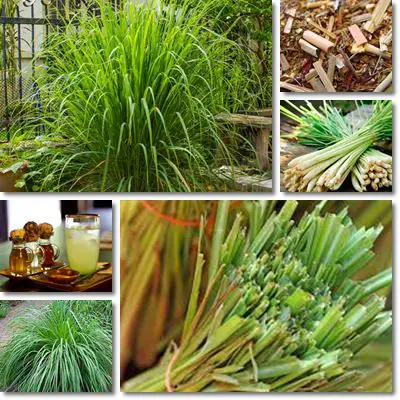
Lemon grass or oil grass (Cymbopogon citratus) is a popular herbal plant and culinary vegetable originating in South and Southeast Asia, but naturalized in numerous other parts of the world.
The leaves of the plant have long been used both as a culinary and medicinal herb and highly appreciated for their strong, pleasant, lemony fragrance. Infusions made from either the fresh or dried leaves of the plant have traditionally been employed for the treatment of a variety of ailments and medical conditions.
These range from gastrointestinal problems, nervous system disorders, cough, rheumatism, nausea and vomiting to abdominal, joint or muscle pain. Research has uncovered the plant also possesses anticancer, antioxidant and anti-inflammatory properties in addition to being a mild natural analgesic and diuretic.
Lemon grass and its essential oil are used in stress relief therapies.

Lemon grass is a sort of grassy plant known for its lemony or citrussy fragrance. From afar, the plant looks like a huge, green tuft of grass with slender and stiff stems and rhizome roots.
The stems, although very similar in appearance to flexible blades of grass projecting their ends downward, are actually quite fibrous and tough. If removed together with a part of the root system, lemon grass stems look a lot like larger, tougher scallions.
As its name suggests, lemon grass has a strong, alluring citrussy or lemony fragrance, with grassy notes and a hint of ginger-like spiciness. As far as taste is concerned, it has a mildly sweet and light lemony taste, with a barely noticeable tartness, less pungent than that of lemons.
Overall, lemon grass is not acidic like lemons and has a considerably more hardy fragrance that oozes into foods it is added to.
Although it is a popular vegetable-herb in Asian cuisine, lemon grass is also cultivated for its essential oil which is primarily used for medicinal purposes.
Read below and find out what are the most remarkable 7 properties and health benefits of lemon grass.
Lemon grass exhibits anti-inflammatory and antispasmodic effects which is why it is commonly used for the treatment and management of various conditions characterized by pain as a result of inflammation or spasms, including muscle pain and muscle spasms, abdominal cramps as a result of indigestion, joint pain caused by rheumatism or arthritis etc.
The analgesic benefits are obtained by the topical use of lemongrass essential oil.

Essential oils in lemon grass leaves and essential oil such as myrcene are believed to be responsible for the anti-inflammatory and analgesic effect of the plant and its essential oil and may be found in concentrations of 12% and up to 25% in the oil (Myrcene mimics the peripheral analgesic activity of lemongrass tea).
Chlorogenic acid, caffeic acid, isoorientin, isoscoparin, orientin and luteolin are just a few of the many antioxidants found in lemon grass (Free radical scavengers and antioxidants from Lemongrass Cymbopogon citratus). Antioxidants scavenge free radicals and protect cells and DNA against damage that may cause them to go haywire and turn cancerous.
In addition to his, by preventing free radical damage from building up in the body, antioxidants from lemon grass also help keep inflammation levels low, which is equal to lower risks of developing chronic disease (heart disease, diabetes, cancer, obesity).
Geraniol and neral, two forms of citral (also called lemonal), a constituent of lemon grass and lemon grass essential oil (up to 85% of volatile oil content) have been found to exhibit a potent antibacterial action against various pathogens, inhibit sepsis development as well as bacterial growth without the pathogens developing resistance to the plant compounds. Citral constituents are also found in lemon balm, lemon and verbena.
Various studies reveal that lemon grass constituents have a strong inhibitory action on gram-positive as well as gram-negative bacteria such as Escherichia coli, Klebsiela pneumoniae, Salmonella enterica, Pseudomonas aeruginosa, Streptococcus aureus and Helicobacter pylori. (Effects of lemongrass oil on the morphological characteristics and peptidoglycan synthesis of Escherichia coli cells) (study).
Lemon grass essential oil has been shown to also be extremely efficient against fungi causing skin fungal infections or mycosis (Essential oils of peppermint, orange or lemongrass kill most strains of fungal and bacterial infections).
The main component, citral, is particularly effective against Candida albicans (studies).
Lemon grass and its derivate essential oil appear to be particularly effective against liver and colon cancers as well as leukemia (source). Citral and monoterpene compounds in general are the ones with the strongest in vitro and in vivo antitumor activity as far as plant essential oils are concerned.
Preliminary research has also revealed that farnesol, another constituent of lemon grass essential oil, boasts antitumor properties.
A Japanese study on rodents has found that linalool, a compound from lemon grass and its essential oil, can effectively reduce stress markers. Drinking lemon grass tea and using its essential oil for stress relief are two natural practices for better coping with stress naturally.
Research suggests that geraniol found in lemon grass has strong anthelmintic properties in vitro and may draw attention on lemon grass as a basis for future medication aiming to treat and prevent infestation with worms and intestinal parasites.
Other studies reveal the plant to hold mild diuretic properties, which might explain its occasional hypotensive (blood pressure reducing) activity. (Pharmacological study of Cymbopogon citratus leaves)
Naturally-occurring compounds in lemon grass and its essential oil, notably citral, are effective insecticides which efficiently repel mosquitoes. However, the constituents responsible for the lemony fragrance of the plant have been shown to attract bees.
Though research is poor, there are studies that show that compounds from lemon grass may inhibit cell division. While this mechanism can help stop cancer cell division and spread (metastasis), it would appear it might affect normal fetal development and potentially lead to developmental problems during pregnancy.
Moreover, some rat studies show high doses of myrcene and citral (two major compounds in lemon grass oil) may prove toxic for unborn babies, hence the recommendation to avoid lemon grass during pregnancy, or at least consult your doctor in order to establish safe doses. Major compounds in the plant, notably citral, may engender allergic reactions. If you are allergic to the plant, avoid it and its essential oil in all forms and preparations.